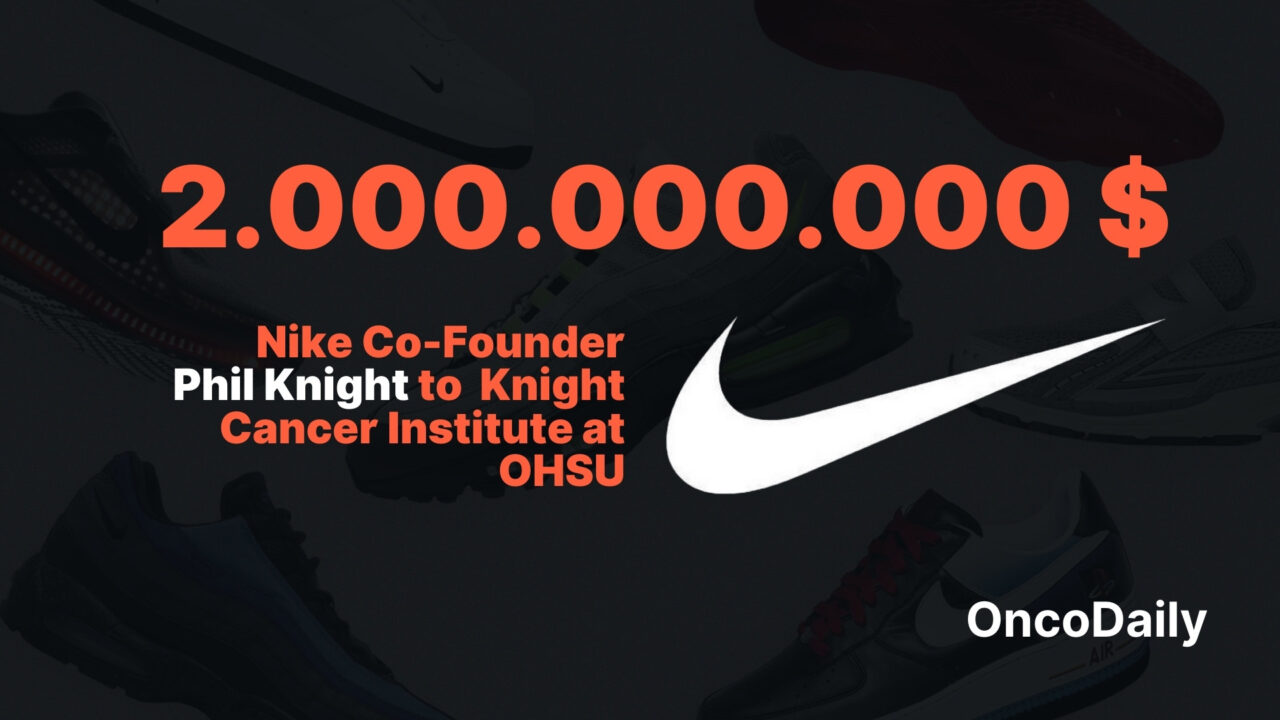
Phil Knight’s Largest-Ever $2 Billion Donation to OHSU Advances Global Cancer Research
Nike co-founder Phil Knight and his wife, Penny Knight, have pledged a historic $2 billion donation to the Oregon Health & Science University (OHSU) Knight Cancer Institute. This landmark gift stands as the largest single donation ever made to a U.S. university, marking a significant milestone in philanthropic support for cancer research and treatment. The generous contribution is set to accelerate innovative breakthroughs in cancer diagnosis, care, and patient support, positioning OHSU at the forefront of cancer research and giving hope to millions affected by this devastating disease.

Background on Phil Knight’s Largest-Ever $2 Billion Donation
Phil Knight, born in 1938 in Portland, Oregon, is the co-founder and former chairman of Nike, one of the world’s most successful sportswear companies. A former track athlete at the University of Oregon, Knight co-founded Nike in 1964 with his coach Bill Bowerman, originally starting as Blue Ribbon Sports before launching the iconic Nike brand in 1972. Under Knight’s leadership, Nike grew into a global powerhouse renowned for athlete endorsements, innovative marketing, and breakthrough product designs.
Knight holds an MBA from Stanford University, where he conceived the idea of importing affordable Japanese running shoes to the U.S., sowing the seeds for Nike’s creation. Over his decades-long career, Knight transformed Nike into a global cultural phenomenon and amassed a personal fortune exceeding $30 billion.
Details of the $2 Billion Donation
On August 13, 2025, Phil Knight and his wife, Penny Knight, announced a historic pledge of $2 billion to the Oregon Health & Science University (OHSU) Knight Cancer Institute. This unprecedented gift, the largest single donation ever made to a U.S. university, was publicized through official statements from OHSU and widely covered by national and international media outlets.
The donation is designated to transform cancer research, diagnosis, treatment, and patient care at OHSU. The Knights intend for the funds to accelerate innovative breakthroughs across the cancer spectrum, including developing cutting-edge therapies and expanding the availability of clinical trials to a broader patient population. Beyond research, the gift emphasizes holistic patient support services, aiming to improve quality of life for those undergoing cancer treatment.
With this monumental investment, the Knight Cancer Institute plans to enhance its capabilities in precision medicine, foster multidisciplinary collaborations, and build state-of-the-art facilities. The donation will also support community outreach, education, and initiatives designed to eliminate disparities in cancer care. This infusion of capital is expected to position OHSU as a global leader in the fight against cancer, offering renewed hope to patients and families worldwide.
What Is the Goal and Vision for the Knight Cancer Institute?
The Knight Cancer Institute at Oregon Health & Science University (OHSU) envisions transforming cancer treatment and care through pioneering research, innovative therapies, and patient-centered services. The $2 billion donation from Phil and Penny Knight empowers the institute to accelerate this vision, positioning it as a global leader in oncology.
A key aspect of this transformation is the institute’s move toward greater self-governance, granting it increased autonomy to make strategic decisions, streamline research initiatives, and rapidly implement cutting-edge clinical advances. This model fosters agility and innovation, enabling the Knight Cancer Institute to respond swiftly to emerging scientific opportunities and healthcare needs.
Central to the institute’s success is the leadership of Dr. Brian Druker, a Nobel Prize-winning oncologist renowned for developing targeted cancer therapies. As director of the Knight Cancer Institute, Dr. Druker spearheads efforts to integrate precision medicine into patient care, expand clinical trials, and nurture collaborations across disciplines. His vision aligns closely with the Knights’ commitment to transforming cancer outcomes through science-driven approaches and compassionate care.
Significance of the Donation
Phil and Penny Knight’s $2 billion donation to the OHSU Knight Cancer Institute is the largest single gift ever made to a U.S. educational or healthcare institution. This unprecedented contribution surpasses previous record-breaking donations, including Michael Bloomberg’s $1.8 billion pledge to Johns Hopkins University.
The sheer size and focused purpose of this gift elevate OHSU’s global standing in cancer research and treatment. It enables the institution to significantly expand its research capabilities, attract top-tier scientists and clinicians, and invest in transformative technologies that have the potential to change how cancer is diagnosed and treated worldwide.
Beyond its financial scale, the donation symbolizes a vital commitment to innovation and patient-centered care. It positions OHSU as a beacon for cutting-edge oncology research and a leading driver in the global fight against cancer, increasing hope for improved outcomes and survival for patients everywhere.
What Did Key Figures Say About the $2 Billion Donation?
Phil and Penny Knight expressed their excitement about the transformative potential of their donation, stating,
“We are grateful for the opportunity to invest in the next stage of the Druker-led revolutionary vision of cancer research, diagnosis, treatment, care, and someday, eradication. We couldn’t be more excited about the transformational potential of this work for humanity. We are confident that establishing the Knight Cancer Institute as a self-governed entity within OHSU will help the Knight and OHSU reach these goals.”
Dr. Brian Druker, director of the Knight Cancer Institute and a pioneer in precision medicine, praised the Knights’ vision and support:
“Penny and Phil Knight have always challenged us to do what no one else is doing. It can seem impossible to navigate the healthcare system after being diagnosed with cancer. We’re going to change that. We have revolutionized the way we detect and treat cancer. Now we are going to transform the way we care for patients while continuing to develop innovative treatments.”
OHSU President Shereef Elnahal emphasized the significance of the gift, saying,
“This gift is an unprecedented investment in the millions of lives burdened with cancer, especially patients and families here in Oregon. It is also a signal of trust in the superlative work that our clinicians, researchers, and teammates at the Knight Cancer Institute do every day.”
Governor Tina Kotek of Oregon remarked,
“OHSU is Oregon’s only academic health care center, and thanks to the generosity and foresight of Mr. and Mrs. Knight, the nation will get to experience life-saving benefits from innovations and expertise in cancer treatment and care as the institution continues to push new boundaries. This gift sends a signal to the world that Oregon is a place where amazing people make amazing things happen.”
Steve Stadum, former OHSU interim president and former chief operating officer of the Knight Cancer Institute, called the donation a game-changer:
“This is an investment that will elevate OHSU and our entire state, give Oregonians another reason to be proud, and most importantly, provide unparalleled support to those with cancer.”
Technology and Infrastructure Upgrades
Phil and Penny Knight’s historic $2 billion gift will enable major technological advancements and infrastructure expansion at the OHSU Knight Cancer Institute to accommodate growing research and patient care demands. This includes the development of state-of-the-art facilities designed to foster collaboration among scientists, clinicians, and support staff, accelerating breakthroughs in cancer detection and treatment.
A centerpiece is the ongoing utilization and expansion of the Knight Cancer Research Building, a seven-floor, 320,000-square-foot facility that serves as a hub for up to 650 researchers and staff. The building, acclaimed for its innovative design and LEED Platinum certification, features specialized wet and dry labs, advanced imaging centers, clinical trial spaces, and patient care units.
With the new funding, OHSU plans to build out additional highly specialized laboratory spaces, including facilities for experimental therapeutics and precision medicine research. This expansion will support the recruitment of top-tier scientists and enhance the capacity for cutting-edge clinical trials, offering patients earlier access to novel and personalized therapies.
The donation also supports infrastructure improvements such as upgraded diagnostic radiology clinics equipped with advanced nuclear medicine and imaging technology, planned expansions in emergency and inpatient care areas, and the creation of hybrid operating rooms integrating surgical and imaging capabilities.
Together, these upgrades will deepen the Knight Cancer Institute’s ability to integrate scientific discovery with comprehensive, patient-centered care, ensuring Oregon remains a leader in cancer research innovation and delivers world-class treatment experiences.
You Can Also Read OncoBillionaires of 2025: The Titans Behind the Cancer Revolution by OncoDaily

You Can Also Watch Leo Messi, Alejandra & Richard Gere, Princess Dina Supporting OncoThon for Childhood Cancer Research
How Phil and Penny Knight’s $2 Billion Donation Boosts OHSU’s Global Cancer Research Collaborations
Phil and Penny Knight’s historic $2 billion donation significantly strengthens the Oregon Health & Science University (OHSU) Knight Cancer Institute’s ability to collaborate with leading international cancer research centers and contribute to worldwide scientific advancements. As a founding member of several key global alliances—such as the International Alliance for Cancer Early Detection (ACED)—the Knight Cancer Institute leverages these partnerships to accelerate research, share data, and develop innovative early-detection technologies.
This philanthropic boost empowers OHSU to expand its role in multi-institutional projects like ACED, Cancer Research UK collaborations, and partnerships with other top precision medicine centers in North America, Europe, and Asia. By breaking down traditional barriers to cooperation—such as limited access to diverse patient cohorts and insufficient clinical samples—these international joint efforts increase the speed and impact of discoveries in cancer biology, diagnostics, and treatment.
The funding also facilitates broader participation in global clinical trial networks, enabling OHSU researchers and patients to access cutting-edge therapies developed through multinational studies. Enhanced resources support cross-disciplinary training, rapid funding mechanisms, and multi-center pilot projects designed to tackle the most challenging cancers.
Ultimately, the Knights’ transformational gift not only elevates OHSU’s status as a premier cancer research hub but also helps set new global standards for collaboration, innovation, and patient-centered care. It amplifies the institute’s mission to end cancer as we know it—benefiting patients and populations far beyond Oregon’s borders.
Written by Aharon Tsaturyan, MD.
FAQ
Who is Phil Knight and what is his connection to Nike?
Phil Knight is the co-founder and former chairman of Nike, one of the world’s largest and most influential sportswear companies. Born in 1938 in Portland, Oregon, Knight started Nike in 1964 with his coach Bill Bowerman under the name Blue Ribbon Sports, before rebranding it as Nike in 1972. He played a pivotal role in transforming Nike into a global brand known for innovation, athlete endorsements, and groundbreaking marketing.
How much did Phil Knight and his wife donate to OHSU?
Phil Knight and his wife, Penny Knight, pledged a historic $2 billion donation to the Oregon Health & Science University (OHSU) Knight Cancer Institute in August 2025. This marks the largest single donation ever made to a U.S. university.
What is the significance of Phil Knight’s $2 billion donation?
The donation is the largest single gift ever made to a U.S. educational or healthcare institution, surpassing all previous philanthropic contributions. It signifies a monumental commitment to advancing cancer research, treatment, and patient care, positioning OHSU at the forefront of global oncology innovation.
How will Phil Knight’s donation impact cancer research at OHSU?
The $2 billion will accelerate innovative breakthroughs in cancer diagnosis, treatment, and research. It will fund cutting-edge therapies, expand clinical trial capabilities, foster multidisciplinary collaboration among top-tier scientists, and enhance holistic patient support services, ultimately transforming cancer care.
What motivated Phil and Penny Knight to make this historic donation?
Both Knights are deeply committed to healthcare innovation and community support. Their motivation stems from a desire to eradicate cancer through revolutionary science and compassionate patient care, building on the institute’s existing legacy and expanding its impact globally.
When was Phil Knight’s $2 billion donation announced?
The donation was publicly announced on August 13, 2025, with official statements from OHSU and widespread media coverage both nationally and internationally.
How does Phil Knight’s donation compare to other large philanthropic gifts?
Phil Knight’s $2 billion gift surpasses notable previous donations such as Michael Bloomberg’s $1.8 billion pledge to Johns Hopkins University, setting a new record for charitable giving to educational and medical institutions in the U.S.
What is Phil Knight’s legacy beyond Nike and philanthropy?
Beyond Nike, Knight is known for his transformative business leadership, philanthropy, and community support. He has played an instrumental role in advancing education, health, and sports initiatives, particularly in Oregon, leveraging his wealth to catalyze societal improvements.
Who leads the research at the Knight Cancer Institute?
The institute is directed by Dr. Brian Druker, a Nobel Prize-winning oncologist credited with pioneering targeted cancer therapies. Under his leadership, the institute integrates precision medicine into patient care and expands clinical trials and research collaborations.
How will the donation improve patient care and clinical trials at OHSU?
The funding enables expansion of specialized laboratories, advanced diagnostic centers, and clinical trial infrastructures. It facilitates earlier patient access to innovative treatments and personalized therapies, improves patient support services, and fosters comprehensive, compassionate care.
What is the OHSU Knight Cancer Institute?
The Knight Cancer Institute is a world-class cancer research and care center at Oregon Health & Science University. It focuses on integrating cutting-edge scientific discoveries directly into patient care through precision medicine and innovative clinical trials.
What makes the Knight Cancer Institute a leader in cancer research?
The institute is known for pioneering targeted therapies, precision oncology, and early cancer detection technologies. It combines multidisciplinary research with clinical application and is recognized globally for its scientific contributions and patient-centered approach.
How will the $2 billion donation be used at the Knight Cancer Institute?
The funds will support infrastructure expansions, advanced laboratory and clinical facilities, enhanced imaging and diagnostic technologies, the recruitment of top researchers, development of novel therapies, and expanded patient support services.
Who is Dr. Brian Druker and what role does he play at the institute?
Dr. Brian Druker is the Nobel Prize-winning director of the Knight Cancer Institute. He is renowned for developing Gleevec, a revolutionary targeted therapy for leukemia, and leads efforts to translate scientific advancements into effective cancer treatments.
What new facilities and technologies are planned for the Knight Cancer Institute?
Planned developments include expansion of the Knight Cancer Research Building, new specialized labs for experimental therapeutics, upgraded diagnostics with advanced nuclear medicine and imaging, hybrid operating rooms combining surgery with imaging capabilities, and patient care units designed for holistic support.
-
Challenging the Status Quo in Colorectal Cancer 2024
December 6-8, 2024
-
ESMO 2024 Congress
September 13-17, 2024
-
ASCO Annual Meeting
May 30 - June 4, 2024
-
Yvonne Award 2024
May 31, 2024
-
OncoThon 2024, Online
Feb. 15, 2024
-
Global Summit on War & Cancer 2023, Online
Dec. 14-16, 2023
